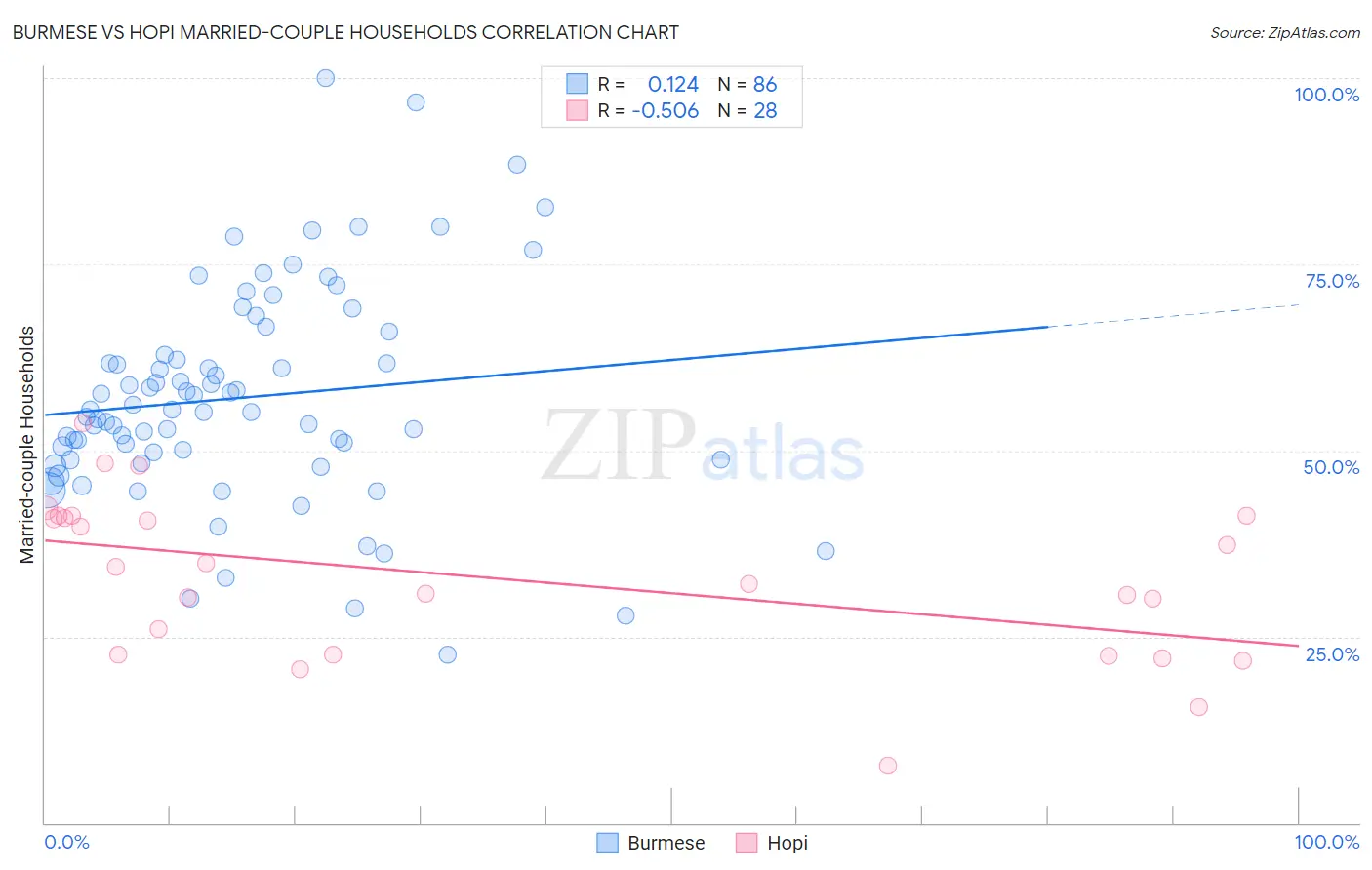Burmese vs Hopi Married-couple Households
COMPARE
Burmese
Hopi
Married-couple Households
Married-couple Households Comparison
Burmese
Hopi
49.8%
MARRIED-COUPLE HOUSEHOLDS
100.0/ 100
METRIC RATING
14th/ 347
METRIC RANK
36.7%
MARRIED-COUPLE HOUSEHOLDS
0.0/ 100
METRIC RATING
345th/ 347
METRIC RANK
Burmese vs Hopi Married-couple Households Correlation Chart
The statistical analysis conducted on geographies consisting of 464,866,079 people shows a poor positive correlation between the proportion of Burmese and percentage of married-couple family households in the United States with a correlation coefficient (R) of 0.124 and weighted average of 49.8%. Similarly, the statistical analysis conducted on geographies consisting of 74,731,609 people shows a substantial negative correlation between the proportion of Hopi and percentage of married-couple family households in the United States with a correlation coefficient (R) of -0.506 and weighted average of 36.7%, a difference of 35.8%.

Married-couple Households Correlation Summary
| Measurement | Burmese | Hopi |
| Minimum | 22.5% | 7.8% |
| Maximum | 100.0% | 53.7% |
| Range | 77.5% | 45.9% |
| Mean | 57.1% | 32.9% |
| Median | 55.3% | 33.2% |
| Interquartile 25% (IQ1) | 48.7% | 22.6% |
| Interquartile 75% (IQ3) | 62.8% | 41.0% |
| Interquartile Range (IQR) | 14.0% | 18.4% |
| Standard Deviation (Sample) | 14.5% | 10.8% |
| Standard Deviation (Population) | 14.4% | 10.6% |
Similar Demographics by Married-couple Households
Demographics Similar to Burmese by Married-couple Households
In terms of married-couple households, the demographic groups most similar to Burmese are Immigrants from Korea (49.9%, a difference of 0.13%), Korean (49.7%, a difference of 0.14%), Swedish (49.7%, a difference of 0.18%), Swiss (49.9%, a difference of 0.30%), and Immigrants from Hong Kong (49.6%, a difference of 0.33%).
| Demographics | Rating | Rank | Married-couple Households |
| Filipinos | 100.0 /100 | #7 | Exceptional 51.0% |
| Immigrants | South Central Asia | 100.0 /100 | #8 | Exceptional 50.6% |
| Pennsylvania Germans | 100.0 /100 | #9 | Exceptional 50.4% |
| Chinese | 100.0 /100 | #10 | Exceptional 50.4% |
| Immigrants | Pakistan | 100.0 /100 | #11 | Exceptional 50.1% |
| Swiss | 100.0 /100 | #12 | Exceptional 49.9% |
| Immigrants | Korea | 100.0 /100 | #13 | Exceptional 49.9% |
| Burmese | 100.0 /100 | #14 | Exceptional 49.8% |
| Koreans | 99.9 /100 | #15 | Exceptional 49.7% |
| Swedes | 99.9 /100 | #16 | Exceptional 49.7% |
| Immigrants | Hong Kong | 99.9 /100 | #17 | Exceptional 49.6% |
| English | 99.9 /100 | #18 | Exceptional 49.6% |
| Europeans | 99.9 /100 | #19 | Exceptional 49.6% |
| Scandinavians | 99.9 /100 | #20 | Exceptional 49.6% |
| Norwegians | 99.9 /100 | #21 | Exceptional 49.5% |
Demographics Similar to Hopi by Married-couple Households
In terms of married-couple households, the demographic groups most similar to Hopi are Immigrants from Cabo Verde (36.2%, a difference of 1.2%), Immigrants from Dominican Republic (37.3%, a difference of 1.8%), Immigrants from Grenada (37.5%, a difference of 2.2%), Pima (35.6%, a difference of 3.2%), and Tohono O'odham (37.9%, a difference of 3.3%).
| Demographics | Rating | Rank | Married-couple Households |
| Immigrants | West Indies | 0.0 /100 | #333 | Tragic 39.0% |
| Immigrants | St. Vincent and the Grenadines | 0.0 /100 | #334 | Tragic 38.7% |
| Senegalese | 0.0 /100 | #335 | Tragic 38.6% |
| Blacks/African Americans | 0.0 /100 | #336 | Tragic 38.5% |
| Immigrants | Somalia | 0.0 /100 | #337 | Tragic 38.4% |
| Immigrants | Senegal | 0.0 /100 | #338 | Tragic 38.4% |
| British West Indians | 0.0 /100 | #339 | Tragic 38.3% |
| Dominicans | 0.0 /100 | #340 | Tragic 38.2% |
| Cape Verdeans | 0.0 /100 | #341 | Tragic 38.1% |
| Tohono O'odham | 0.0 /100 | #342 | Tragic 37.9% |
| Immigrants | Grenada | 0.0 /100 | #343 | Tragic 37.5% |
| Immigrants | Dominican Republic | 0.0 /100 | #344 | Tragic 37.3% |
| Hopi | 0.0 /100 | #345 | Tragic 36.7% |
| Immigrants | Cabo Verde | 0.0 /100 | #346 | Tragic 36.2% |
| Pima | 0.0 /100 | #347 | Tragic 35.6% |